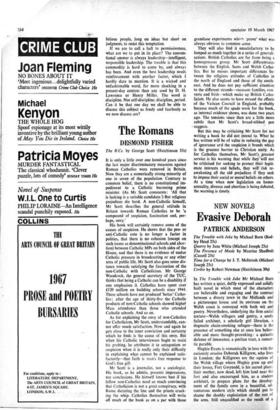The Romans
DESMOND FISHER
The R.Cs. by George Scott (Hutchinson 35s) It is only a little over one hundred years since the last major discriminatory measures against Roman Catholics were removed in Britain. Now they are a numerically strong minority of one in seven of the population. Contrary to common belief, there is no constitutional im- pediment to a Catholic becoming prime minister. (As Mr Scott comments: 'All that is lacking is a suitable candidate.') But religious prejudices die hard. A non-Catholic himself, Mr Scott describes the general attitude in Britain towards Roman Catholics to be 'a compound of suspicion, fascination and, per- haps, envy.'
His book will certainly remove some of the causes of suspicion. He shows that the pro- or anti-Catholic vote is no longer a factor in politics, that there is no cohesion (except on such issues as denominational schools and abor- tion) between Catholic MPs on both sides of the House, and that there is no evidence of undue Catholic pressure in broadcasting or any other area of public life. Mr Scott also goes some dis- tance towards satisfying the fascination of the non-Catholic with Catholicism. Mr George Woodcock, the general secretary of the TUC, thinks that being a Catholic can be a disability if one emphasises it. Catholics have spent over £120 million on building schools since 1944. These schools have not produced 'better' Catho- lics: after the age of thirty-five the Catholic products of non-Catholic schools showed higher Mass attendance than those who attended Catholic schools. And so on.
As for explaining the envy of non-Catholics for Catholicism, Mr Scott, understandably, can- not offer much satisfaction. Now and again he gets close to the inner conviction and certainty which he finds is the cause of this envy. But when his Catholic interviewees begin to resist his probing, he attributes it to antagonism or suspicion when it is really only their difficulty in explaining what cannot be explained satis- factorily—that faith is man's free response to God's free gift.
Mr Scott is a journalist, not a sociologist. His book, as he admits, presents impressions, not conclusions. He himself knows best if his fellow non-Catholics need so much convincing that Catholicism is not a great conspiracy, with Rome dictating the line and the priests crack- ing the whip. Catholics themselves will write off much of the book as on a par with those grandiose experiments whieh 'prove' what was always obvious to common sense.
They will also find it unsatisfactory to be lumped so much together in a series of generali- sations. British Catholics are far from being a homogeneous group. Mr Scott differentiates between the English, Scots and Welsh Catho- lics. But he misses important differences be- tween the religious attitudes of Catholics in the north of England and those of the south- east And he does not pay sufficient attention to the different strands—recusant families, con- verts and Irish—which make up British Catho- licism. He also seems to have missed the effects of the Vatican Council in England, probably because much of the spade work for the book, as internal evidence shows, was done two years ago. The tensions since then are a little more subtle than Mr Scott's broad-nibbed pen suggests.
But this may be criticising Mr Scott for not writing a book he did not intend to. What he has written will be of value in reducing the gap of ignorance ard the suspicion it breeds which is the greatest barrier to Christian unity. As for Catholics themselves, Mr Scott's _greatest service is his warning that while they Will not be criticised for seeking to protect their legiti- mate interests and beliefs, they will risk re- awakening all the old prejudices if they seek to impose their social or moral beliefs on others. At a time when new legislation on homo- sexuality, divorce and abortion is being debated, the warning is timely.






























 Previous page
Previous page